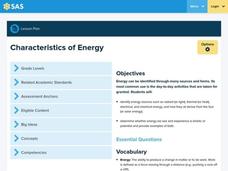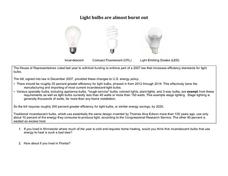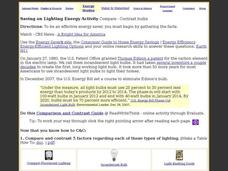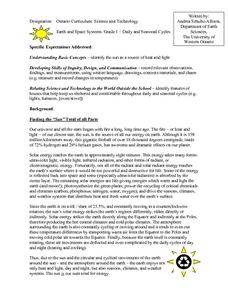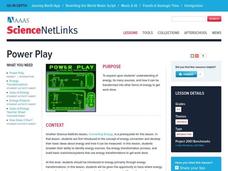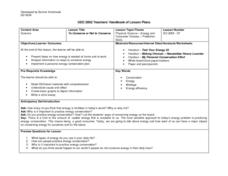Curated OER
Characteristics of Energy
Fourth graders view a video and create a KWL to identify energy sources. For this energy sources lesson, 4th graders explore the meaning of energy, kinetic energy, potential energy, thermal energy, radiant energy, and electrical energy....
Curated OER
How Much Energy is Stored in Wood?
In this energy lesson, students create calorimeters out of soda cans and use them to calculate the amount of energy stored in different types of wood.
Curated OER
Observing Chemical Reactions
Start this series of lessons with a bang! Five exothermic reactions are outlined in this resource, including a demonstration that produces both light and sound. In the lab, chemistry apprentices record temperature changes, make hand...
Curated OER
How Much Energy Do You Use?
Students take a survey of energy-consuming appliances in their homes and calculate the daily cost of operating these machines. They identify those appliances that consume the most energy and consider ways to reduce the amount of energy...
Curated OER
Wavelengths of Light
Explore physical science by participating in a visual spectrum experiments. Budding scientists identify the colors in the color spectrum and view the colors in class by utilizing cellophane, flash lights, and other arts and crafts...
Curated OER
Heat from Light
Second graders explore solar energy. In this science lesson, 2nd graders use hand lenses to see that light energy can be converted to heat energy.
Curated OER
Light Bulbs are Almost Burned Out
Incandescent light bulbs were enlightening more than 130 years when Thomas Edison invented them. More recently, US Congress passed legislation to increase efficiency standards. Your 5th, 6th, or 7th graders will be enlightened as they...
Curated OER
Solar Sweet Tea
Students study the sun. In this heat energy lesson, students use the sun's warmth to make tea. They place a few jars with tea bags and water in the sun and discuss what the sun is doing to the water while they wait for the tea to brew....
Curated OER
Saving on Lighting Energy Activity
In this saving energy worksheet, students compare and contrast the effectiveness of compact fluorescent lighting, incandescent light bulbs, and light emitting diodes.
Curated OER
How Long Will It Last?
Students turn on a flashlight and leave it on until the energy is used up (12-36) hours. They estimate or preduct how long they think the energy in the batteries will last. They then estimate how long a birthday candle will burn, giving...
University of Waikato
Māui and the Sun
Using a Maori legend, How Maui Tamed the Sun, youngsters are introduced to the importance of sunlight to civilization. Teach them about nuclear fusion that occurs to produce the solar energy we later receive on Earth as electromagnetic...
Purdue University
Field Trip Snack Holder
Is light related to insulation? An informative hands-on STEM activity demonstrates how light affects temperature. First, the class investigates how light passes through different mediums and how that relates to temperature. Then,...
Curated OER
Daily and Seasonal Cycles
First graders identify the sun as a source of heat and light. They identify features of houses that help keep use sheltered and comfortable throughout daily and seasonal cycles. Students are told that summer is the best season to...
Chicago Botanic Garden
Albedo, Reflectivity, and Absorption
What is reflectivity, and what does it have to do with the Earth's climate? As reflectivity is measured by albedo, scientists can gather information on Earth's energy balances that relate to global warming or climate change. Budding...
Curated OER
Household Conservation/Efficiency
Hook your class up to an online home energy usage calculator so that they can estimate the amount used per month by their families. Then give them Watt meters with which they will measure the power consumption of several small...
Biology Junction
Photosynthesis: Energy and Life
All life requires energy ... and the connection between energy and plant life typically requires photosynthesis. Scholars explore photosynthesis in depth from ATP/ADP through the Calvin cycle. A helpful presentation highlights concepts...
Cornell University
What Happens When We Excite Atoms and Molecules?
Excited atoms lead to exciting lessons! Learners use heat and light to excite both atoms and molecules. They display their learning in the form of Bohr models depicting the excited state of the atoms.
Curated OER
Make a Solar Oven
Students build a solar oven. In this Science lesson plan, students construct a functional solar oven. Students design the oven and explain the energy concepts involved.
Curated OER
Power Play
Once your physical science stars have a grasp of the different forms of energy, use this resource to get them putting the energy to work. Small groups choose from seven different project options and work together to build an energy...
Curated OER
TO CONSERVE OR NOT TO CONSERVE
Students explore how energy is wasted at home and at work and develop a program to save energy in a specific area.
Curated OER
The Greenhouse Effect
Why does it get so hot inside of our cars in the summertime? The greenhouse effect! Lab groups experiment to see what happens to an ice cube enclosed in a jar and placed in sunlight as compared to an ice cube outside of the jar. They...
Texas State Energy Conservation Office
Investigation: Waves and Whistles
Wave goodbye to the same old demonstrations for alternative energy sources, and wave hello to this one investigating ocean waves! Using a water bottle to create an oscillating water column, learners see and possibly hear how the...
Curated OER
Rooftop Gardens
Second graders investigate how to help a city building remain cooler on the inside. They create a rooftop garden in order to shield the building and lower the internal temperature. The garden is meant to replace the black tar paper that...
Curated OER
Energy Detective Worksheet
For this energy worksheet, students explore their environment to find items that use energy. Students then write a definition of energy. This worksheet has 1 graphic organizer and 1 short answer question.


